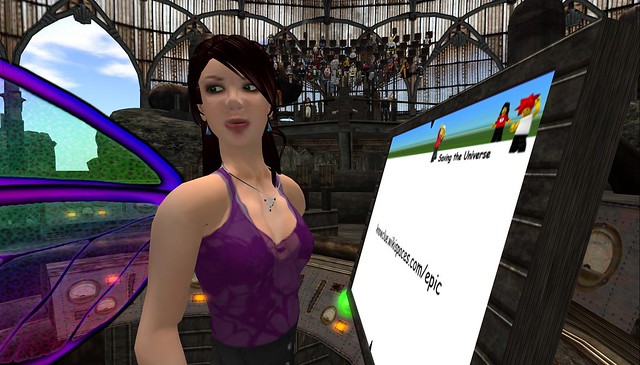By no means a comprehensive summary since I can only hop in from time to time, but I wanted to jot down notes and interesting information from the Virtual Worlds Best Practices in Education conference going on now in multiple VWs including Second Life, Opensim, World of Warcraft, and others. Â The full schedule is here and if for some reason you can’t go in-world to view, many of the sessions are being webcast on Treet.tv too.
Epic Win! Epic Fail! – Marianne Malmstrom (SL: Knowclue Kidd)

An inspiring opening keynote address that highlighted some “epic” projects that bring about “epic” learning. Â Links to all the topics discussed available at: Â http://knowclue.wikispaces.com/epic
One of the projects I was most interested in was 3D Game LabLÂ http://3dgamelab.org.shivtr.com/
Collaborative Learning, Cognitive Processes, Telerobotic Communication and Japan Recovery in Virtual Spaces – Michael Vallance, Stewart Martin

Really fascinating project teLEGOrobotics –  getting students from the UK and Japan to work collaboratively in Opensim to control physical real world robots.  They plan to model a nuclear reactor in a future stage of the project.
The Hypergrid is Ready for You Now – Maria Korolov

Maria talked about the Opensim Hypergrid as the new frontier, provided tons of links and resources, including destinations to visit, hosting providers, and two very easy ways to get started trying Opensim – Kitely and New World Studio.
How Immersion in Virtual and Augmented Worlds Helps Students in the Real World – Chris Dede

Chris talked broadly about using immersive spaces in education and gave examples from his own research (currently the EcoMUVE project), showed video, talked at length about alternative forms of assessment that can be used with immersive learning, suggested participants download and read the learning section of the National Education Technology Plan, and shared his class syllabi which also includes references and citations for further research into these topics.   This was a really great presentation.
Interview with John Lester (Pathfinder)
John Lester (aka Pathfinder Lester), Chief Learning Officer, ReactionGrid Inc. gave a great talk about Jibe as a multiuser 3d virtual world platform accessible via a web browser or standalone client, discussion also covered differences between Unity/Jibe and Opensim, plans for the “ji-way” (unity based hypergrid), keeping in touch with the educational community involved in virtual worlds, and bunches more. Â Great talk! Â Here are some links I pasted in as the talk was going on:
http://www.scribd.com/doc/81798024/Jibe-Unity-School-Quick-Start-Guide
http://reactiongrid.blogspot.com
http://reactiongrid.deviantart.com
https://play.google.com/store/apps/details?id=com.ReactionGrid.JibeAndroid
http://rutgers.jibemix.com/jibe/
http://metaverseheroes.helpserve.com/
http://groups.google.com/group/jibe-and-unity3d?pli=1
Unity offering free licenses for Android and ioS thru April 18, 2012: Â https://store.unity3d.com/products
Collaboration on Virtual Harmony: STEM Research on the Mars Geothermal, Nonlinear Game Design on Atlantis and Unity3D, and the Migration to MOSES - Cynthia Calongne, Andrew Stricker
Virtual Harmony is a custom virtual environment that spans over 32 simulations to promote exploration and compelling learning experiences for education in Science, Technology, Engineering, and Mathematics (STEM) as well as the study of history, leadership, innovation and military tactics. This paper introduces the current game design activities on Virtual Harmony and in Unity3D, the collaborative activities on the Military Open Simulator Enterprise Strategy (MOSES) project and a research study that evaluated the use of model-based reasoning and somatic computing for evaluating alternatives in avatar morphology to enhance STEM learning experiences within a Mars Geothermal game simulation. Â Also discussed Kolb’s Learning Style Inventory.
They also showed a video: Â http://gallery.me.com/astricker#100068